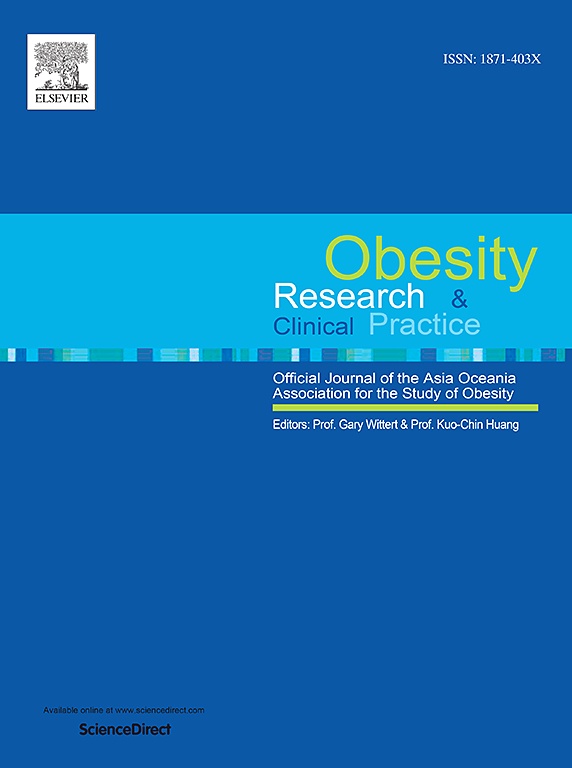Skipping breakfast and nutrient density: Influence on obesity, blood pressure, glucose, and cholesterol in elementary school students
IF 2.5
4区 医学
Q3 ENDOCRINOLOGY & METABOLISM
引用次数: 0
Abstract
Background
Skipping breakfast is a public health issue affecting childhood obesity worldwide. However, how skipping breakfast adversely affects metabolic health in children has not been investigated comprehensively. This study investigated the associations between breakfast skipping, obesity, and cardiometabolic risk in elementary school students and identified its association with nutritional patterns.
Methods
Data on 3590 elementary school students were obtained from the Korea National Health and Nutrition Examination Survey (2013–2020). Participants self-reported weekly breakfast frequency, and dietary nutrient intake was assessed using a 24-h recall survey. The associations of breakfast frequency with obesity, cardiometabolic risk factors, and nutrient density were analyzed using a survey multivariate linear regression analysis.
Results
The lowest breakfast frequency group (0–2 times/week) had a higher mean body mass index (estimated mean differences; 0.80 kg/m2, 95 % confidence interval (CI) 0.30–1.31) and waist circumference (2.20 cm, 0.83–3.57) than the highest frequency group (5–7 times/week). Additionally, they had higher systolic blood pressure (1.68 mmHg, 0.12–3.24), diastolic blood pressure (2.24 mmHg, 1.09–3.39), fasting glucose (1.58 mg/dL, 0.40–2.75) than the highest breakfast group. Furthermore, this group had higher percentages of energy from fat (1.96 %, 0.90–3.02), sodium density (10.29 mg/100 kcal, 0.75–19.82) and Na/K ratio (0.25 mmol/mmol, 0.11–0.40) than the highest frequency group, despite lower caloric intake.
Conclusions
Elementary school students who skipped breakfast had higher obesity and cardiometabolic risk factors. These associations might be assumed from dietary nutrient patterns characterized by higher fat and sodium density despite lower daily caloric consumption.
不吃早餐与营养密度:对小学生肥胖、血压、血糖和胆固醇的影响。
背景:不吃早餐是影响全球儿童肥胖的公共卫生问题。然而,不吃早餐对儿童代谢健康的负面影响尚未得到全面调查。本研究调查了小学生不吃早餐、肥胖和心脏代谢风险之间的关系,并确定了其与营养模式的关系。方法:从韩国国家健康与营养调查(2013-2020)中获取3590名小学生的数据。参与者自我报告每周早餐频率,并使用24小时回忆调查评估膳食营养摄入量。采用多元线性回归分析,分析早餐频率与肥胖、心脏代谢危险因素和营养物质密度的关系。结果:最低早餐频率组(0-2次/周)的平均体重指数较高(估计平均差异;0.80 kg/m2, 95 %置信区间(CI) 0.30 ~ 1.31),腰围(2.20 cm, 0.83 ~ 3.57)较最高频次组(5 ~ 7次/周)明显增高。此外,他们的收缩压(1.68 mmHg, 0.12-3.24)、舒张压(2.24 mmHg, 1.09-3.39)和空腹血糖(1.58 mg/dL, 0.40-2.75)都高于吃早餐最多的那组。此外,尽管热量摄入较低,但该组的脂肪能量百分比(1.96 %,0.90-3.02)、钠密度(10.29 mg/100 kcal, 0.75-19.82)和Na/K比(0.25 mmol/mmol, 0.11-0.40)均高于最高频率组。结论:不吃早餐的小学生有较高的肥胖和心脏代谢危险因素。这些关联可以从膳食营养模式中推断出来,其特征是高脂肪和高钠密度,尽管每日热量消耗较低。
本文章由计算机程序翻译,如有差异,请以英文原文为准。
求助全文
约1分钟内获得全文
求助全文
来源期刊

Obesity research & clinical practice
医学-内分泌学与代谢
CiteScore
7.10
自引率
0.00%
发文量
80
审稿时长
49 days
期刊介绍:
The aim of Obesity Research & Clinical Practice (ORCP) is to publish high quality clinical and basic research relating to the epidemiology, mechanism, complications and treatment of obesity and the complication of obesity. Studies relating to the Asia Oceania region are particularly welcome, given the increasing burden of obesity in Asia Pacific, compounded by specific regional population-based and genetic issues, and the devastating personal and economic consequences. The journal aims to expose health care practitioners, clinical researchers, basic scientists, epidemiologists, and public health officials in the region to all areas of obesity research and practice. In addition to original research the ORCP publishes reviews, patient reports, short communications, and letters to the editor (including comments on published papers). The proceedings and abstracts of the Annual Meeting of the Asia Oceania Association for the Study of Obesity is published as a supplement each year.
 求助内容:
求助内容: 应助结果提醒方式:
应助结果提醒方式:


